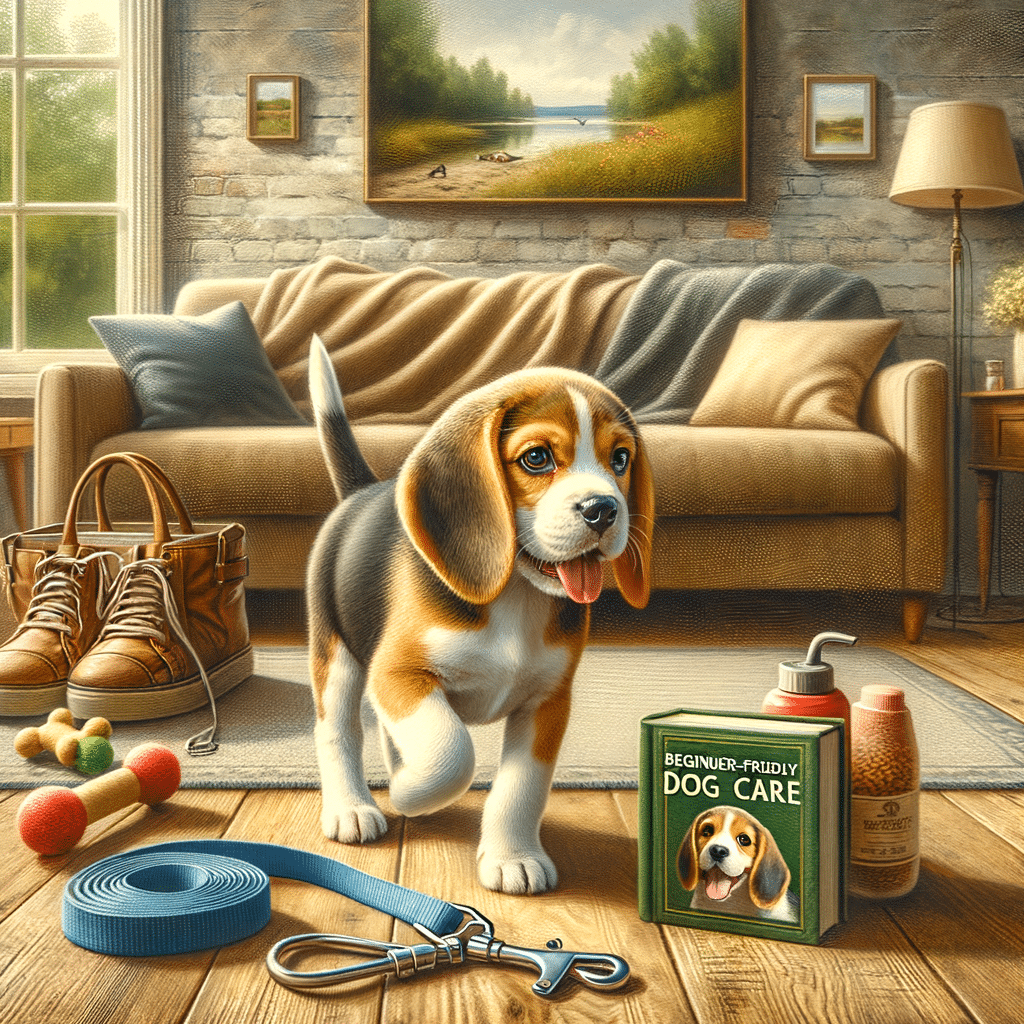Beagles are exceptional pets because of their keen sense of smell and friendly demeanor. However, giving your beagle pup a joyful and fulfilling life requires specific care and attention.
In This Article
Understanding the nuances of beagle care will substantially improve their quality of life, ensuring they remain healthy and content. To guarantee your beagle’s well-being, focus on their dietary needs, invest time in consistent training for good behavior, and ensure plenty of physical and mental stimulation.
Proper healthcare and regular grooming are non-negotiable for maintaining your beagle’s overall health. Beagle owners must also be aware of the breed’s typical health issues and take proactive steps to prevent them. By addressing the fundamentals of proper care and providing company and affection, beagle owners can ensure their furry companions lead the best life possible.
Highlights
- A beagle's health and happiness rely on a balanced diet and thorough behavior training.
- Regular exercise and mental engagement are crucial for a beagle's well-being.
- Consistent healthcare and grooming are vital to preventing common beagle health issues.
Fundamentals of Beagle Care
Providing exceptional care for a beagle requires understanding its specific health and dietary needs. To promote the well-being of your beloved pet, ensure regular vet visits and maintain a proper vaccination schedule.
Nutritional Needs
A balanced diet is critical for a beagle’s overall health. Provide high-quality dog food that caters to this dog breed’s energetic nature. A beagle’s diet should include:
- Protein: Essential for muscle health and repair.
- Antioxidants: Support immune function and overall wellness.
- Feeding schedule: Beagle experts recommend consistent meal times, usually twice daily.
Routine Vet Visits
Regular check-ups with a veterinarian are important to monitor your pup’s health. At each visit, the vet might:
- Conduct a physical examination.
- Assess weight and dietary concerns.
- Discuss preventative measures for common beagle health issues.
Importance of Vaccinations
Vaccinations play a vital role in preventing diseases in beagles. Vaccinations should be administered according to a schedule recommended by the vet, which typically includes:
- Core vaccines: Distemper, Parvovirus, Hepatitis, and Rabies.
- Non-core vaccines: Based on lifestyle and risk factors, like Bordetella for kennel cough.
Beagles thrive when they receive tailored care that meets their unique needs. This includes nutrition, consistent vet care, and a structured vaccination program.
Training and Socialization
Proper beagle training and socialization are crucial to the pup’s well-being. Training sessions ensure your pup leads a fulfilling life, develops good habits and social skills, and is obedient. Each training session is essential for preventing behavioral issues and promoting a positive relationship between you and your beagle pup.
Obedience Training Essentials
Obedience training for a beagle pup should start early. It establishes clear communication between you and your dog. Teaching your dog basic commands also ensures they understand the expected behavior.
Key commands include:
- Sit: Important for teaching your beagle self-control and calmness.
- Stay: Prevents unwanted chasing, which is important given this breed is naturally a scent hound.
- Come: Vital for safety, ensuring the beagle returns when called.
- Leave it: Protects your beagle from eating harmful objects or foods.
Consistency, patience, and positive reinforcement are critical during your training sessions. Use treats and praise as rewards when your dog listens to your instructions.
The Role of Socializing
Socialization helps your beagle become well-adjusted and confident in various environments. Introduce your dog to different environments, including:
- People: Ensuring comfort with adults, children, and diverse groups.
- Dogs: Learning to interact peacefully with other canines, ideally in a controlled setting.
- Situations: Exposure to different scenarios to prevent fear-driven responses.
Gradual and positive experiences help reduce the likelihood of your beagle developing fearful or aggressive behaviors. It’ll also encourage your pup’s independence and help avoid separation anxiety.
Effective Potty Training
For potty training, a beagle puppy requires a routine that includes the following:
| Time | Action |
| Upon Waking | Take them to a designated potty area. |
| After Meals | Consistent timing after eating helps instill a routine. |
| After Playtime | Physical activity often stimulates the need to go. |
| Before Bedtime | Prevents overnight accidents and promotes better sleep. |
Supervising your pup helps prevent accidents in the house. In case your pup makes a mistake, be gentle when correcting it rather than punishing it. Reward your beagle for using the appropriate potty area to encourage them to repeat the desired behavior.
Exercise and Play
Proper exercise and play are crucial for your pup’s physical and mental well-being. Remember, beagles are hound dogs, so they naturally want to roam. Regular physical activity helps your dog remain healthy and joyful.
Daily Exercise Needs
An adult beagle typically requires 60–90 minutes of exercise daily, broken into at least two sessions to manage their high energy levels. For senior beagles, 30–60 minutes of daily exercise is enough to remain healthy. Favor gentler activities with older beagles due to their age.
Daily exercise can include:
- Leash walks: A simple yet effective way to keep them active.
- Hiking: Offers varied terrain and mental stimulation.
- Sniff walks: Allow them to engage their powerful sense of smell.
Interactive Games and Activities
Playing integrative games with your beagle helps to hold their interest and stops them from wandering. Specifically, games that require your beagle to find items based on scent can help develop and satisfy their scent-hound instincts. Additionally, activities such as fetch, tug-of-war, and hide-and-seek are excellent for bonding and can be set up as follows:
- Fetch: Use a ball or a frisbee in a safe, fenced yard.
- Tug-of-war: A rope toy works well for this game; ensure it's sturdy.
- Hide-and-seek: Conceal treats or toys around the house or yard for them to find.
Beagle Agility Training
Agility training can channel your beagle’s natural energy into an enjoyable and fulfilling activity. It enhances their agility, provides mental challenges, and strengthens the bond between you and your pet.
A basic agility training setup may include obstacles like:
- Jumps: These can be adjusted to the dog's size and ability.
- Tunnels: Encourages the beagle's natural curiosity and problem-solving skills.
- Weave poles: Improves coordination and physical agility.
Incorporating these activities regularly can significantly improve your pet’s quality of life, keeping them active, engaged, and joyful.
Health and Grooming
Caring for your beagle’s health and grooming is essential for your pet’s well-being. Regular grooming, at least once a week, is essential to maintaining your pup’s coat and skin. Similarly, consistent dental care, such as brushing and dental chews, helps prevent dental diseases and tooth decay. Finally, ear care helps avoid ear infections common in this breed.
Coat and Skin Care
Beagles have a short, dense coat that requires regular brushing to minimize shedding. Brushing also helps distribute the natural oils that maintain healthy skin. Experts recommend brushing your pup’s coat at least once a week with a soft-bristle brush. This breed is known for moderate shedding, so routine brushing helps remove excess shedding and keeps your dog’s coat looking glossy.
- Brushing frequency: Once a week
- Tools needed: Soft-bristled brush
Dental Care and Hygiene
Dental care for beagles helps prevent plaque buildup, which can lead to gum disease. Brush your pup’s teeth at least twice or thrice a week with a toothbrush and toothpaste designed specifically for dogs. Regular vet check-up visits can help ensure the dog’s teeth and gums remain healthy.
- Brushing frequency: At least twice or thrice a week
- Vet check-ups: Routine dental assessments
Preventing Ear Infections
Beagles have floppy ears that trap moisture and debris, leading to ear infections. To prevent an ear infection, it’s essential to check and clean their ears regularly. A vet can guide you on proper ear-cleaning techniques and solutions. Additionally, crate training provides a safe and familiar space for grooming and ear care routines.
- Ear checks: Weekly or bi-weekly
- Crate training: Helps create a grooming routine in a safe and familiar space
Frequently Asked Questions
This section answers common questions about beagle training, care, activities, health, leadership, and scent training.
How can I train my beagle effectively?
Effective beagle training requires consistency, patience, and positive reinforcement. This dog breed responds well to treats and praises as motivators. It’s also critical to start beagle training early to set clear boundaries.
What are some essential care tips for beagle owners?
Ensure your pet has a balanced diet, regular exercise, and routine vet check-ups. Keeping your dog’s living space clean and safe is also essential for their well-being.
What activities do beagles enjoy the most?
Beagles, scent hounds, enjoy activities that stimulate their strong sense of smell. They love walks in nature, tracking games, and playtime that involves hide-and-seek with treats or scented toys.
How can I maintain my beagle’s health indoors?
To maintain a Beagle’s health indoors, provide them with interactive toys to prevent boredom and separation anxiety. Additionally, control their diet to avoid obesity and engage in indoor exercise routines to keep them active.
What type of leadership should I provide for my beagle?
Beagle owners should exhibit calm and assertive leadership. Applying rules consistently and training your beagle helps them understand expectations and builds trust. Be gentle but firm with your discipline.
What are the best practices for scent training a beagle?
When scent training a beagle, start with simple exercises such as identifying different scents and gradually progress to more complex tasks like following scent trails. Always use positive reinforcement to encourage and reward progress.






